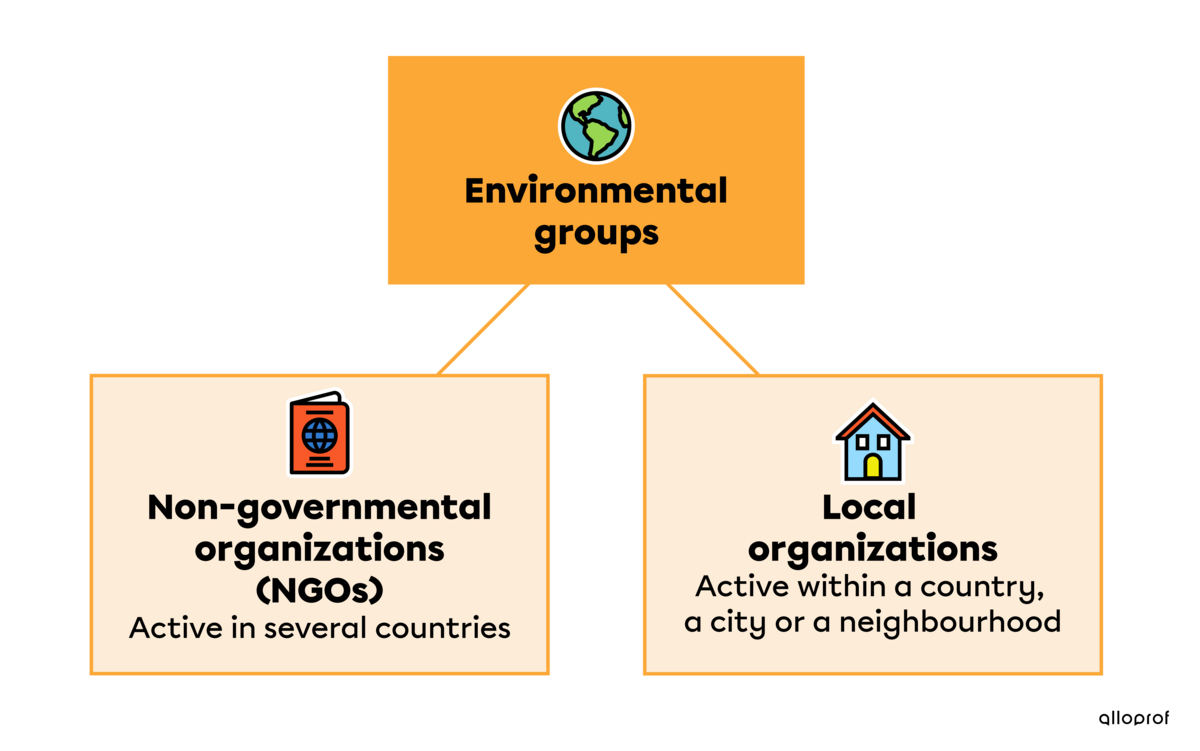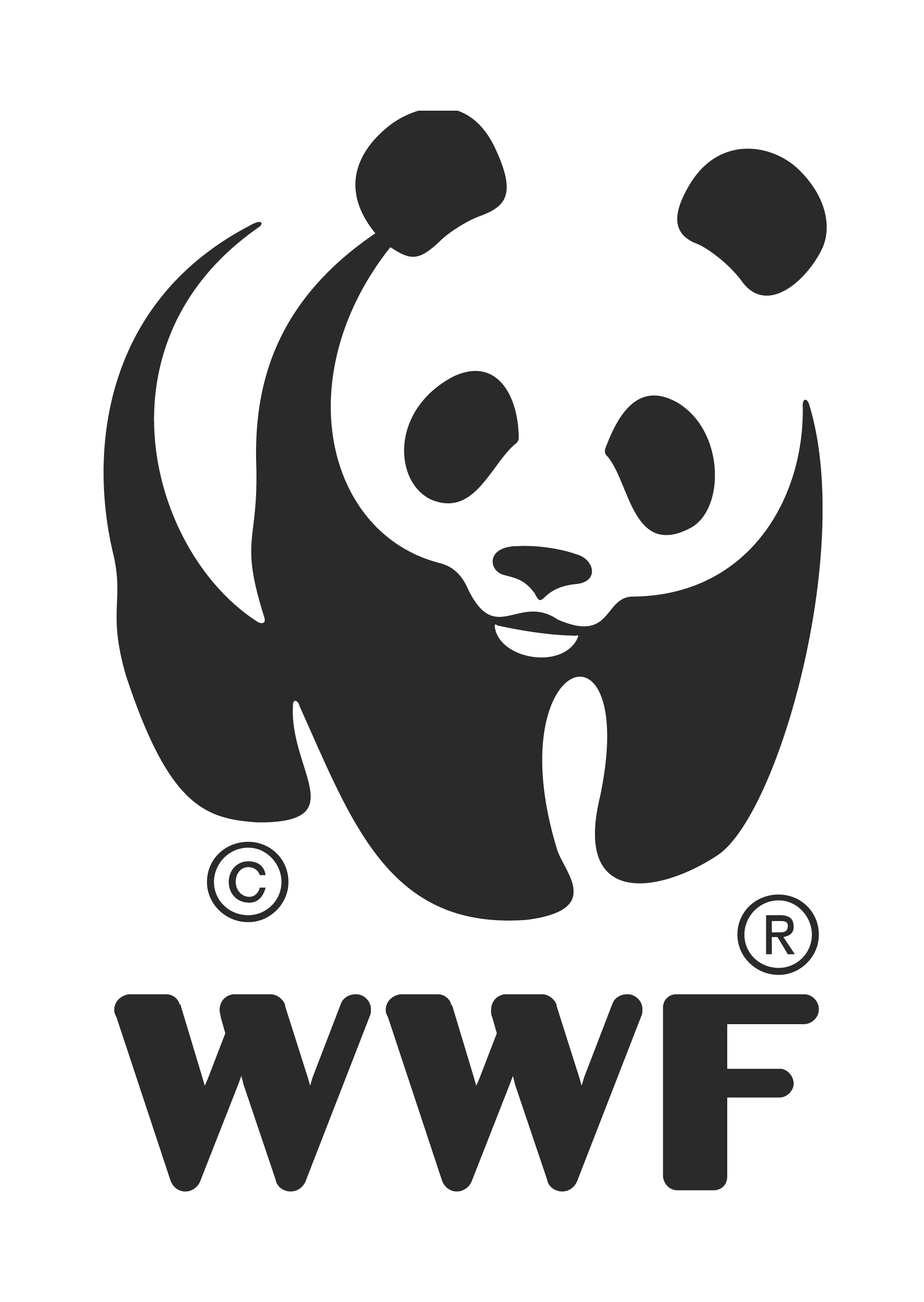Awareness of the various global environmental problems has led many people to take action. Alarmed by the situation, citizens decided to take concrete action to protect the environment. These citizens organized themselves into groups called environmental activist groups.

Some of these environmental groups are called non-governmental organizations (NGOs). The goal of NGOs is not to make money, but to defend the causes they care about.
Unlike NGOs, international organizations (IOs) are tied to governments and work on an international scale, as the name suggests.
-
An international organization (IO) is an organization that brings together representatives of different states to address global issues and achieve common goals.
-
A non-governmental organization (NGO) is a non-profit organization of citizens defending a cause and acting independently of the government.
In general, environmental NGOs aim to raise awareness among citizens. These groups monitor companies and governments and alert the public when they make decisions that could have devastating environmental impacts. The United Nations (UN) sometimes gives these groups special status and asks them to act as expert environmental consultants during major negotiations between countries.
The following are examples of international environmental NGOs: Greenpeace, Friends of the Earth International (FOEI) and the World Wildlife Fund (WWF). Since these groups act on a global level, their actions have no geographical boundaries. Of course, there are many more of these organizations around the world.
Some NGOs depend on voluntary funding from states while others depend on private funding. This means that NGOs like Greenpeace refuse money from governments. Instead, they rely on donations from their members or other foundations. Why? Because most environmental NGOs want to maintain their independence and integrity. They want to avoid governments demanding certain actions or favours from them in return for funding. With this in mind, some NGOs refuse money from companies. Financial independence allows NGOs to maintain their full freedom of expression and action without any obligation to governments or companies.
To understand this dynamic better, let’s make up a fictional NGO called Health-EE. This NGO brings together various scientists who research the effects of food on overall health. More precisely, the goal is to study the effect of soft drinks on health through donations from the public. A soft drink company called Pop Pop was interested and offered to fund nearly the entire study. Do you think the company would pressure researchers to skew their research results? Do you think scientists will be able to present the results that prove if they show that soft drinks are unhealthy? This would compromise the freedom, integrity, honesty and transparency of the research findings.
The same idea applies to environmental NGOs. Imagine if an NGO was funded by an oil company. This would lead to risks of corruption by allowing the oil company to influence the NGOs actions in its favour in exchange for donations.
 |
|
| Date founded | In 1971, in Canada. It eventually became an international organization. |
|---|---|
| Number of members | Three million people around the world participate in the group by supporting its fundraising and awareness campaigns. |
| Values | Non-violence, environmental protection, peace, equity, sustainable development. |
| Global mission |
|
| Specific objectives |
To stop:
To advocate for:
|
| Resources and approaches to achieve objectives |
|
-
Biodiversity refers to all living organisms (animals and plants) inhabiting the planet.
-
Sustainable development is a principle according to which a society meets the needs of the present without compromising the ability of future generations to meet their needs.
-
Fossil fuels are non-renewable energy sources that come mainly from hydrocarbons (oil, natural gas, coal, etc.).
-
A genetically modified organism (GMO) is a living organism whose genes have been modified by humans. An example of a GMO is corn with modified genes to make it tastier or more resistant to the cold.
Greenpeace Cracks Down:
 |
|
| Date founded | Independent organization founded in 1970. |
|---|---|
| Number of members | Over 2 million members and supporters around the world. |
| Values | Peace, sustainable development, environmental protection, solidarity, dignity, unity, gender equality, citizen participation, justice. |
| Global mission |
|
| Specific objectives |
To advocate for:
To stop:
|
| Resources and approaches to achieve objectives |
|
Visit the website: Friends of the Earth International
 |
|
| Date founded | This group was founded in 1961 and is considered the largest independent international nature conservation NGO. |
|---|---|
| Number of members | Nearly 5 million members. |
| Values | Sustainable development, science, cooperation, collaboration, environmental protection. |
| Global mission |
|
| Specific objectives |
To advocate for:
To combat:
|
| Resources and approaches to achieve objectives |
|
Some environmental groups are smaller and more local, but their involvement is still very important. These organizations often provide practical solutions that allow citizens to make real changes in their lifestyles. For example, a list of environmental groups in Quebec is available on the Réseau québécois des groupes écologistes (RQGE) website. The l actions and results of these organizations demonstrate that protecting the environment is not only about government or large NGO interventions, but also small-scale initiatives.
The environmental group Prêt-à-reporter is located in a shop in the town of Nicolet, near Trois-Rivières. It recycles used clothing. This shop offers thrift shopping and sewing services to extend the life of clothes, or give them a second life. Thrifting aims to reduce the environmental impacts of the fashion industry, which is not always sustainable. We seem to be buying five times more clothing than we did 20 years ago, and tons of it ends up in the trash.
Brodeur-Girard, Sébastien and collabs. Immédiat, 2009.
Choquette, Michel and collabs. Enjeux, 2010.
Ladouceur, Maude and collabs. Globe, 2014.